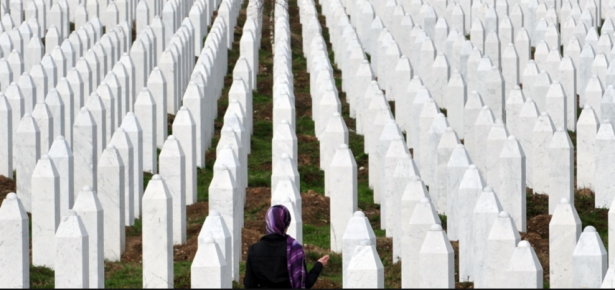
On March 24, a Trial Chamber at the International Criminal Tribunal for the Former Yugoslavia is scheduled to announce its ruling on whether Karadžić is guilty of genocide and crimes against humanity during the Bosnian war (1992-1995). Victim and survivor communities throughout the former Yugoslavia fervently hope he will be judged guilty and given a long prison sentence. His family, supporters, and many of his fellow Serbs, on the other hand, yearn for the less likely outcome of his complete exoneration. Whatever the judgment, its announcement will be a landmark event in the turbulent history of Southeast Europe as well as in the annals of international criminal justice.
Prosecutors presented a convincing case against Karadžić, who acted as his own defense attorney in the trial. They introduced into evidence hundreds of his speeches to public and private gatherings, transcripts of hundreds of intercepted telephone conversations with close associates, and the testimony of hundreds of witnesses who witnessed brutality against non-Serb victims. Prosecutors also selected the most revealing documents from a mountain of evidence captured in raids by NATO-led international peacekeeping forces.
As a witness at his trial, I was asked by prosecutors to provide the content and context of some of the documents they entered into evidence. During the trial I came to know much more about Karadžić, both from the documentary record and during his 22 hours of cross-examining me. I realized I had come upon an extraordinarily rich record of the words and deeds of this enigmatic, widely feared former leader. My personal encounters with him, along with the documents I reviewed, made it possible for me to write Radovan Karadžić: Architect of the Bosnian Genocide, an intimate political biography of this profoundly influential and larger-than-life figure. My aim was to give a more comprehensive account of his life than the Tribunal’s judgment is likely to contain. I wanted to share with readers my own puzzlement with his improbable transformation from an unremarkable pre-war psychiatrist and family man into a powerful wartime leader of a political organization that carried out mass atrocities against non-Serbs.
Like other cases tried before the Tribunal, Karadžić’s case centers not on whether war crimes were committed – that issue was decided affirmatively in numerous prior trials – but whether Karadžić was personally and criminally responsible for some of them. In his defense, he attributed much Serb-initiated violence to renegade paramilitaries or rogue individuals rather than to the political party he led. He contended that Serb acts of violence were justifiable, spontaneous responses to provocations and threats from rivals. In support of that argument, he submitted many documents that pointed to the perfidy of his opponents, documents I also found useful in writing his biography.
All of us will know on March 24 whether or not his arguments have prevailed. Though a few other decisions are yet to come, the Trial Chamber’s judgment of Karadžić will reverberate throughout the lands of the former Yugoslavia. It may well rekindle nationalist passions, and it will profoundly affect global perceptions of the Tribunal’s fairness and effectiveness.
Early risers in the U.S. can watch the judgement streamed live from the Tribunal’s Courtroom One at on Thursday, March 24, at 8:00 a.m. Eastern Standard Time. Additionally, I will post another blog on this site shortly after the judgment is read, reporting on the results and analyzing the judgment’s significance.
Latest Comments
Have your say!